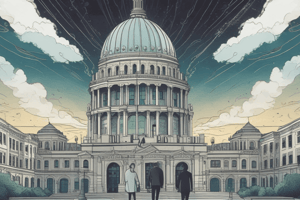Podcast
Questions and Answers
What is the primary role of an Ombudsman?
What is the primary role of an Ombudsman?
- To influence legislative processes
- To enforce laws and regulations
- To provide legal representation in court
- To investigate and address complaints of maladministration (correct)
Which of the following is NOT a reason for the growth of the Ombudsman?
Which of the following is NOT a reason for the growth of the Ombudsman?
- Overlapping of Legislative and Executive Powers
- Increased legislative authority (correct)
- Build-up of Biasness
- Inadequacy of the Court System
What factor diminishes the efficacy of judicial review of administrative actions?
What factor diminishes the efficacy of judicial review of administrative actions?
- Affordable court fees
- Judicial reluctance to review discretionary actions (correct)
- Prompt evidence acquisition
- Clear procedural guidelines for administration
How is the Ombudsman positioned within the administrative structure?
How is the Ombudsman positioned within the administrative structure?
What issue arises from the internal remedy system of administration?
What issue arises from the internal remedy system of administration?
What is one of the challenges courts face in reviewing administrative actions?
What is one of the challenges courts face in reviewing administrative actions?
Which statement accurately reflects the role of the legislature in administrative actions?
Which statement accurately reflects the role of the legislature in administrative actions?
Which of the following best describes the nature of complaints handled by Ombudsmen?
Which of the following best describes the nature of complaints handled by Ombudsmen?
What is the role of an Ombudsman in relation to complaints?
What is the role of an Ombudsman in relation to complaints?
What challenge does the legislative body face regarding control over administrative actions?
What challenge does the legislative body face regarding control over administrative actions?
Why is it easier to find faults in the administrator's actions when a complaint is addressed by an independent body?
Why is it easier to find faults in the administrator's actions when a complaint is addressed by an independent body?
Which of the following statements about the Ombudsman is true?
Which of the following statements about the Ombudsman is true?
What primary function does an Ombudsman perform during an investigation?
What primary function does an Ombudsman perform during an investigation?
What does the term 'party system' imply regarding the executive's control over the legislative?
What does the term 'party system' imply regarding the executive's control over the legislative?
What is a significant limitation of the Ombudsman compared to a court?
What is a significant limitation of the Ombudsman compared to a court?
In what way does an Ombudsman act as a watchdog over administrative actions?
In what way does an Ombudsman act as a watchdog over administrative actions?
Flashcards
Ombudsman
Ombudsman
An independent government official appointed to investigate complaints of misconduct or abuse of power by public officials. They act as a watchdog to protect the rights of citizens.
Judicial Review
Judicial Review
The process where a court reviews the legality and fairness of an administrative action. This is a key safeguard against abuse of power by government agencies.
Inadequacy of the Court System
Inadequacy of the Court System
The inability of the court system to effectively address all complaints against government agencies. This can be due to factors like complex legal procedures, high costs, and limited access to evidence.
Build-up of Biasness
Build-up of Biasness
Signup and view all the flashcards
Overlapping of Legislative and Executive Powers
Overlapping of Legislative and Executive Powers
Signup and view all the flashcards
Administrative Complaint Handling
Administrative Complaint Handling
Signup and view all the flashcards
Bias in Administrative Decisions
Bias in Administrative Decisions
Signup and view all the flashcards
Independent Review of Administrative Decisions
Independent Review of Administrative Decisions
Signup and view all the flashcards
Legislative Oversight of Administration
Legislative Oversight of Administration
Signup and view all the flashcards
Executive Influence on Legislature
Executive Influence on Legislature
Signup and view all the flashcards
Limited Legislative Time for Complaints
Limited Legislative Time for Complaints
Signup and view all the flashcards
The Role of the Ombudsperson
The Role of the Ombudsperson
Signup and view all the flashcards
Ombudsperson's Relief Options
Ombudsperson's Relief Options
Signup and view all the flashcards
Study Notes
LAW 309: Chapter 7 - Public Complaints Bureau & Ombudsman
- This chapter discusses the Public Complaints Bureau and the Ombudsman.
Ombudsman
- An Ombudsman, or public advocate, is a government official.
- They are appointed by the government or parliament, but with significant independence.
- Their role is to represent the public interest by investigating complaints of maladministration or human rights violations.
- The Ombudsman operates as an external agency, independent of the administrative hierarchy.
- Their goal is to investigate and address administrative faults.
Reasons for the Growth of the Ombudsman
- Inadequacy of the Court System:
- Judicial review of administrative actions is hampered by factors like poorly defined legislative norms and guidelines for administrative power.
- Courts are often reluctant to review discretionary administrative actions, and substituting their judgment for administrative officials.
- Courts don't always have access to crucial evidence found in departmental files.
- Judicial proceedings are lengthy, formal, and costly.
- Build-up of Biasness in the Department:
- Internal remedies within administrative departments don't always guarantee fairness.
- Initial decisions at lower administrative levels can frequently lead to biased decisions at higher levels.
- Independent bodies or external agencies can identify administrative faults more easily, thus preserving public trust.
- Overlapping of Legislative and Executive Powers:
- Though the legislature controls administrative actions, the system is often ineffective due to the development of party politics.
- Legislatures often prioritize other pressing issues, and so do not prioritize complaints.
How the Ombudsman Works
- Investigation: The Ombudsman acts like a counsel, so the complainant doesn't have to prove their case with evidence.
- Relief: Ombudsmen can't overturn administrative decisions like courts. They can address issues such as delays and perceived bias in administrative actions. They can investigate and offer relief to individuals for issues beyond the scope of a court's jurisdictional power.
- Reporting: Ombudsmen report individual grievances and investigation results to the legislature.
Advantages of the Ombudsman
- Independent Authority: Eliminates public dissatisfaction.
- Access to Departmental Files: Provides the ombudsman with all necessary information to resolve cases.
- No Court Fees: Prevents financial barriers to access for the public.
- No Need for a Lawyer: The ombudsman acts as a lawyer in certain situations.
- Relief for Individuals: Addresses issues that courts may not cover.
- Speedy and Less Formal: Streamlined proceedings that help with the speed of the resolution.
- Legislature Support: Recommendations are often accepted by the departments.
Studying That Suits You
Use AI to generate personalized quizzes and flashcards to suit your learning preferences.




